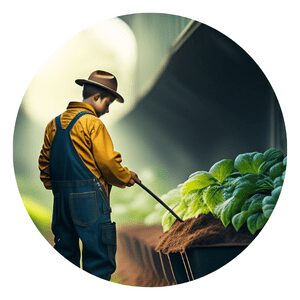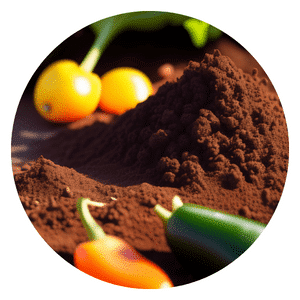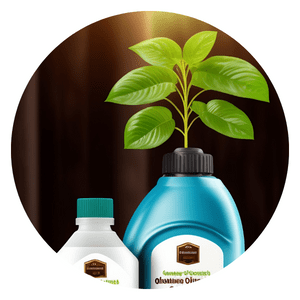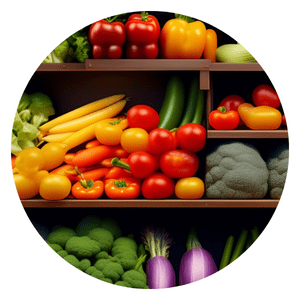what's the difference between organic and inorganic vegetables
As consumers become more health-conscious, the demand for organic produce has soared.
But what exactly sets organic vegetables apart from their inorganic counterparts? Is there really a difference in taste or nutrition?
Understanding the nuances between these two types of vegetables not only helps shoppers make informed decisions, but it also sheds light on the impact of farming practices on our environment and our health.
In this article, we’ll explore the key differences between organic and inorganic vegetables so that you can make informed choices when shopping for your next meal.
Organic & Inorganic Menu
Farming Methods
Organic vegetables are grown without the use of synthetic pesticides, fertilizers, or genetically modified organisms (GMOs).
Instead, organic farmers use natural methods to control pests and weeds, such as crop rotation and companion planting.
These methods prioritize soil health by using practices like cover cropping and composting to build healthy soil rich in nutrients that support plant growth.
In contrast, conventional or non-organic vegetables are grown using synthetic pesticides and fertilizers.
While these methods may produce higher yields in the short term, they can negatively impact soil health over time.
Inorganic farming also relies heavily on monoculture crops which reduces biodiversity and can increase the risk of pest outbreaks.
Choosing between organic and inorganic vegetables ultimately comes down to personal preference and values.
While organic options may be more expensive at times due to their production costs, they offer a sustainable alternative that supports healthier soils and ecosystems while reducing the exposure of harmful chemicals for both consumers and farmers alike.
Soil Health
Soil health is a crucial aspect of agriculture, and organic farming places great emphasis on it.
Organic farmers employ a range of techniques to build and maintain healthy soil.
Composting is one such technique; it involves the decomposition of organic matter, which results in nutrient-rich soil that can improve plant growth.
Crop rotation is another method where different crops are planted in succession to prevent depletion of nutrients from the soil.
Cover cropping, or planting crops specifically for their ability to benefit the soil rather than for harvest, can also help maintain soil health by adding organic matter and preventing erosion.
On the other hand, inorganic farming often relies on chemical fertilizers that provide plants with necessary nutrients but may not necessarily improve long-term soil health.
Additionally, these fertilizers may lead to contamination of groundwater or other environmental issues if not used properly.
Inorganic farming also typically involves monoculture practices where only one crop is grown repeatedly in the same field without any rotation or cover cropping, leading to soil depletion over time.
As consumers become more aware of these differences between organic and inorganic farming practices, they are increasingly seeking out produce grown organically for its perceived benefits both for their health and for the environment as a whole.
Pesticide Use
Pesticides are chemicals that are used to kill pests and protect crops from damage.
However, synthetic pesticides can have harmful effects on the environment and human health.
Organic vegetables are grown without the use of these synthetic pesticides, instead relying on natural pest management techniques.
Crop rotation is one such technique, where different crops are grown in a particular area each season to ensure that pests do not develop resistance to a specific crop.
This also helps maintain soil fertility and prevent soil-borne diseases.
Beneficial insects like ladybugs and lacewings are introduced into the fields as natural predators of harmful insects.
Organic farmers also use organic pesticides derived from natural sources such as plant-based oils or minerals like copper and sulfur. These substances occur naturally in the environment and break down quickly without leaving harmful residues.
In contrast, conventional farming practices rely heavily on synthetic pesticides that can have long-lasting negative impacts on the environment and human health.
By choosing organic vegetables over inorganic ones, consumers can help support sustainable agriculture practices that promote healthy soils, ecosystems, and communities.
Organic veggies grow with care, No pesticides or chemicals are there, Inorganic ones, on the other hand, Sprayed with toxins - it's what we can't stand. Organic veggies, taste sublime, Clean and pure - without any grime. Inorganic don't meet the same grade, So go organic and feel unafraid.
Chappy The Gardener
Genetic Modification
Genetic modification is a process that involves altering the genetic makeup of an organism in order to introduce new traits.
This process is commonly used in agriculture to produce crops that are resistant to pests or disease, have longer shelf lives, or are more nutritious.
Organic vegetables are non-GMO, meaning they have not been genetically modified using laboratory techniques.
Instead, organic farmers use natural methods like crop rotation and companion planting to protect their crops from pests and diseases.
Inorganic vegetables, on the other hand, may include genetically modified varieties that have been developed for specific purposes.
For example, some strains of corn have been engineered with genes from bacteria so that they produce their own pesticide.
While this may reduce the need for chemical sprays, it has raised concerns about the long-term effects of consuming genetically modified foods.
Overall, the choice between organic and inorganic vegetables comes down to personal preference and values.
Some people prefer organic produce because it is grown without synthetic pesticides or fertilizers and supports sustainable farming practices.
Others choose inorganic produce because it can offer benefits like increased yields or resistance to pests and disease.
Ultimately, both options can be part of a healthy diet as long as they are consumed in moderation and as part of a balanced meal plan.
Environmental Impact
Organic farming practices typically involve the use of natural fertilizers such as compost and manure, rather than synthetic fertilizers.
This not only reduces chemical runoff into nearby water sources but also promotes healthy soil, which is important for maintaining ecological balance.
In addition, organic farmers often utilize crop rotation and other techniques to preserve biodiversity by avoiding monoculture.
On the other hand, inorganic farming may involve the use of synthetic pesticides and herbicides that can have negative impacts on both human health and the environment.
These chemicals can leach into nearby water sources or accumulate in the soil over time, potentially causing harm to wildlife and even humans who come into contact with them.
Additionally, inorganic farming methods may rely heavily on monoculture crops that can disrupt natural ecosystems.
Overall, choosing organic vegetables over inorganic ones can help reduce environmental impact while promoting better health for both consumers and our planet.
Nutritional Value
Organic vegetables are those that are grown without the use of synthetic fertilizers, pesticides, and other chemicals.
On the other hand, inorganic vegetables are grown using these chemicals.
While there is a lot of debate over which is better for health, studies have shown that organic vegetables may have higher levels of certain nutrients.
For example, one study found that organic tomatoes had significantly higher levels of vitamin C and antioxidants than their conventional counterparts.
Another study found that organic spinach had higher levels of iron and vitamin C than conventionally grown spinach.
However, it is important to note that not all studies have found differences in nutritional value between organic and inorganic vegetables.
Ultimately, the choice between organic and inorganic vegetables depends on personal values and priorities.
While there may be some small differences in nutritional value, both types of vegetables can contribute to a healthy diet when consumed as part of a balanced meal plan.
Residue Levels
Organic vegetables are those that are grown without the use of synthetic pesticides, fertilizers, or other chemicals.
Instead, organic farmers rely on natural methods like crop rotation and composting to enrich the soil and protect plants from pests and diseases. This means that organic vegetables typically have lower pesticide residue levels than inorganic vegetables.
Inorganic vegetables, on the other hand, are grown using synthetic pesticides and fertilizers.
These chemicals can remain in the soil and on the crops long after they are applied, leading to higher levels of pesticide residues.
In addition, inorganic farming practices often involve monoculture – growing only one type of crop over a large area – which can increase susceptibility to pests and diseases.
While organic vegetables may have lower pesticide residue levels than inorganic vegetables, it’s important to note that even organic produce can contain trace amounts of pesticides.
However, these levels are generally considered safe for human consumption. To minimize exposure to pesticides from all sources, it’s recommended to wash all fruits and vegetables thoroughly before consuming them.
Taste and Flavor
Organic vegetables are grown without the use of synthetic fertilizers, pesticides, or genetically modified organisms.
Instead, farmers use natural methods to promote healthy soil and plant growth.
Organic farming practices focus on crop rotation, companion planting, and other techniques that help to maintain a diverse ecosystem in the soil.
Many people believe that these practices contribute to a better taste and flavor in organic vegetables.
Studies show that organic produce often contains higher levels of antioxidants and other beneficial nutrients than conventionally grown produce.
In addition, organic farming practices may help to preserve the natural flavors of fruits and vegetables by allowing them to ripen more slowly on the vine.
While there is no definitive answer as to whether organic vegetables always taste better than their conventional counterparts, many people find that they do.
Whether you choose organic or conventional produce is ultimately up to you – but if you’re looking for great taste and flavor, it’s definitely worth considering giving organics a try!
Synthetic Additives
Organic vegetables are grown without the use of synthetic fertilizers, pesticides, and herbicides. This means that they are free from harmful chemicals that can be detrimental to our health.
In addition to this, organic vegetables are also free from synthetic additives such as artificial colors, flavors, and preservatives. These additives are often used in inorganic vegetables to enhance their taste and appearance.
On the other hand, inorganic vegetables may contain these additives which can have negative effects on our health.
Artificial colors have been linked to hyperactivity in children while artificial sweeteners may lead to weight gain and other health problems.
Preservatives such as sodium benzoate have also been associated with various health issues including asthma.
Therefore, it is important to choose organic vegetables over inorganic ones whenever possible.
Not only do they provide more nutrients and fewer harmful chemicals but they also taste better without the need for synthetic additives.
By choosing organic produce we can ensure that we are consuming safe and healthy food that nourishes our bodies rather than harming them with synthetic chemicals.
Long-Term Sustainability
Organic farming practices prioritize long-term sustainability by maintaining soil fertility, reducing chemical inputs, and promoting ecological balance.
In contrast, inorganic farming may focus on maximizing short-term yields using synthetic fertilizers, pesticides, and genetically modified crops. These practices can have negative effects on the environment and human health over time.
Organic farmers use a variety of techniques to maintain soil fertility without relying on synthetic fertilizers. These include crop rotation, cover cropping, and composting.
By rotating crops and planting cover crops between cash crops, organic farmers help improve soil structure and nutrient content while reducing erosion. Composting also helps build healthy soils by adding organic matter that provides nutrients for plants.
Inorganic farming often relies heavily on synthetic pesticides to control pests and diseases. This can lead to the development of pesticide-resistant insects as well as contamination of surrounding ecosystems with toxic chemicals.
Organic farmers instead use natural methods such as biological pest management, crop rotation, and intercropping to minimize the need for chemical inputs.
This helps support a healthier ecosystem for both plant growth as well as animal habitat maintenance by avoiding harmful pollutants that could otherwise leach into groundwater or other water sources used in agriculture processes.
Regulation and Certification
While organic vegetables are strictly regulated and certified to ensure they meet specific guidelines and practices, inorganic vegetables do not have such certifications.
Inorganic vegetables may be grown using synthetic pesticides, fertilizers, and genetically modified organisms (GMOs) that can harm the environment and human health.
Without regulation or certification, it is difficult for consumers to know what chemicals were used during the production of inorganic vegetables.
Additionally, inorganic vegetables often contain lower levels of nutrients than their organic counterparts due to the intensive farming methods used.
Overall, choosing organic produce is a safer option for both consumers and the environment. The strict regulations and certifications provide assurance that the food was produced using sustainable farming practices without harmful chemicals or GMOs.
Consumer Choice
Organic vegetables are grown without the use of synthetic fertilizers, pesticides, or genetically modified organisms (GMOs).
Instead, farmers rely on natural methods to manage pests and enrich the soil.
Choosing organic vegetables can have a positive impact on the environment by promoting sustainable farming practices that help preserve soil health and biodiversity.
In contrast, inorganic vegetables are conventionally grown using chemical fertilizers and pesticides to maximize yields. This process may be harmful to the environment as it contributes to water pollution and soil degradation.
In addition, consuming inorganic vegetables may expose consumers to harmful synthetic chemicals that have been linked to numerous health problems.
By choosing organic vegetables, consumers can support sustainable agriculture while also reducing their exposure to harmful chemicals.
Additionally, organic farming practices promote better animal welfare and contribute positively towards reducing greenhouse gas emissions.
Overall, opting for organic produce is a smart choice for both personal health and environmental sustainability.
Lorem ipsum dolor sit amet, consectetur adipiscing elit. Ut elit tellus, luctus nec ullamcorper mattis, pulvinar dapibus leo.
Click To Grow
Helps Us Grow – Share If You Like

















